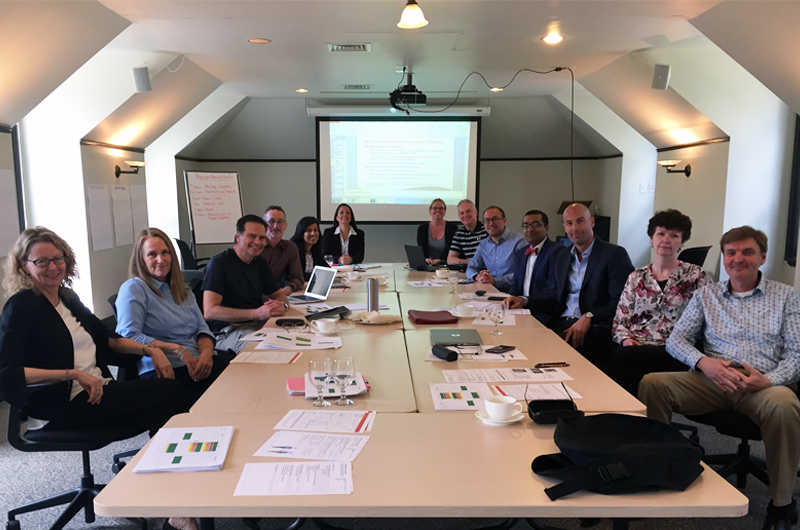Imaging Wisely: Communicating and Collaborating to Improve Imaging Services
Dec 13, 2017 - Viewpoints
See how the Medical Imaging Integrated Care Project has collaborated on reducing unnecessary imaging tests and created tools for improving access to care.
Imaging Wisely: Communicating and Collaborating to Improve Imaging Services
Dec 13, 2017 - Viewpoints
See how the Medical Imaging Integrated Care Project has collaborated on reducing unnecessary imaging tests and created tools for improving access to care.

The increasing demand for MRI and CT scans has led to longer wait times for imaging services across the country. As the demand for these services remains high, clinicians and patients have noticed the challenge in accessing these services.
In Ontario, the South West Local Integrated Health Integration Network (SWLHIN) funded the Medical Imaging Integrated Care Project to address long wait times in imaging services in the region. Since the fall of 2016, the project has engaged a multi-disciplinary team representing imaging to implement ways to improve access and minimize inappropriate studies.
The project began with addressing inappropriate ordering of MRI scans. With limited resources in MRI and CT equipment, ensuring the right patient has access to the right service at an appropriate time is a key goal for those involved in the project.
“Working as a radiologist, I see many cases where a patient did not need an MRI study ordered,” says Dr. Christian Baldauf, current Physician Lead on the project and MRI Director at Grey Bruce Health Services. “Recognizing we needed to address this issue, we developed tools and resources that would help reduce the overuse of imaging services.”
MRI Requisition Form and Appropriateness Checklists
SWLHIN is the first LHIN to implement a standard MRI requisition form that can be used at any hospital site in the region. Supporting the MRI requisition forms are two appropriateness checklists for knee and spine. The checklists allow physicians to determine if an MRI is necessary and which conditions may not benefit from a scan. Completing the form also provides referring physicians with a tool to educate and counsel patients on the appropriateness of MRIs based on their specific symptoms.
“We worked very closely with referring physicians on our MRI and appropriateness checklist to ensure they were included and happy with the process we were implementing,” says Dr. Baldauf. “We also included Choosing Wisely branding on all of our forms because we believed by showing these tools and protocols were part of this larger campaign, we could encourage and motivate our colleagues to make smart and effective care choices.”
Ensuring patients receive the same quality services and experience no matter what site they visit was also an important aspect to integrate into this project. By introducing one requisition form and ensuring each hospital is delivering the same quality of imaging, the region would be able to reduce and eliminate unnecessary duplication of ordering and testing.
“We often see a scan is duplicated because the initial imaging study did not provide the information a clinician needed at a separate site,” says Dr. Baldauf. “By ensuring we have the same standard in imaging, we can avoid unnecessary duplication of studies and free up resources to ensure urgent and pertinent requests are dealt within an appropriate time frame.”
Collaborating Across the Region
The Medical Imaging Integrated Care Project has been a collaborative effort between a multi-disciplinary team working to streamline and improve medical imaging in the region.
For many in the region, coming together to discuss what each site is doing has become a valuable aspect of the project. Dr. Walt Romano, the previous Physician Lead of the project and Radiologist with St. Thomas Elgin General Hospital believes these conversations are essential to providing better care for patients. “There is a clear benefit to patient care when there is better communication between our clinical colleagues and diagnostic imaging staff,” says Dr. Romano. “We can provide better, more comprehensive care, and share our ideas and solutions to common issues across the region.”
“Historically, as radiologists, we had so many opportunities to have discussions with our clinical colleagues that allowed us to be aware of our problems or concerns in how we were ordering our tests,” says Dr. Romano. “As we’ve had more technological advances in imaging, we’ve definitely seen better efficiencies. However, we’ve lost some of those moments of communication because everything is sent to our desk. We don’t have the opportunity to sit in a group and discuss or troubleshoot problems as they are happening.”
But Dr. Romano says the Medical Imaging Integrated Care Project is encouraging dialogue between sites and allows colleagues to work collaboratively in solving some of these issues.
“My favourite part of this project is that we are all communicating with each other. We have clinicians and referring physicians speaking with radiologists, speaking with specialists. It has allowed us to come together and focus on choosing wisely in diagnostic imaging,” says Dr. Romano.
With the first phase of the project currently underway, the next step will be creating a standardized CT requisition form and protocols. Those involved say they look forward to continuing their collaborative efforts to providing quality care across the region.
Additional Resources:
Learn More About the Medical Imaging Integrated Care Project
